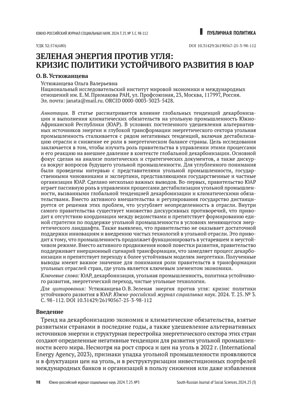Abstract
The article explores the impact of global decarbonization trends and climate pledges on the South African coal industry. As alternative energy sources become cheaper and structural changes emerge in the energy sector, negative trends in coal industry development arise, namely industry destabilization. This study aims to investigate the government’s role in this process. It analyzes policy and strategic documents and the discourse surrounding decarbonization and the coal industry’s future. Interviews with coal industry representatives, officials, and experts from government and non-government organizations in South Africa were conducted. The study shows that South Africa’s government plays a passive role in managing the destabilization processes in the coal industry caused by global decarbonization trends and climate commitments. It distances itself, exacerbating uncertainty in the industry. There are numerous discursive contradictions within the government itself, leading to a lack of coordination between agencies and hindering the development of a unified strategy to support the coal industry in a changing energy landscape. The author revealed that the government does not support innovations and the implementation of clean technologies in the coal sector. As a result, the industry continues to operate in an outdated and unsustainable mode. Rather than promoting a new development agenda, the government supports an inertial transformation scenario, slowing down the decarbonization process and hindering the transition to more sustainable energy models. The findings are significant for understanding the role of governments in transforming the coal sectors of countries where coal remains a vital element of the economy.
Keywords
References
- Abraham, J. (2017). Just Transitions for the Miners: Labor Environmentalism in the Ruhr and Appalachian Coalfields. New Political Science, 39, 218–240.
- Beck, B., Kulichenko-Lotz, N., & Surridge, T. (2017). World Bank CCS Program activities in South Africa — Results and Lessons Learned. Energy Procedia, 114, 5636–5649. DOI: 10.1016/j.egypro.2017.03.1702
- Betsill, M., & Stevis, D. (2015). The Politics and Dynamics of Energy Transitions: Lessons from Colorado’s (USA) “New Energy Economy”. Environmental Planning C, 34, 381–396.
- Climate Home News (2023, June 19). South Africa’s Coal Lobby is Resisting a Green Transition. Retrieved from https://www.climatechangenews.com/2023/06/19/south-africa-coal-energy-fossil-fuels-climate-lobby
- Climate Change Bill: Public Hearings (2022, September 07). National Resource Management and Working on Fire Programme: DFFE briefing; Deputy Minister. Forestry, Fisheries and the Environment. Retrieved from https://pmg.org.za/committee-meeting/35483/
- Coal Colloquium (2022, February 01). Minister Gwede Mantashe: Coal Colloquium, Retrieved from https://www.gov.za/speeches/minister-gwede-mantashe-coal-colloqiuim‑1‑feb‑2022–0000
- Coaltech (2024) Socio-Economic Research Reports. Retrieved from https://coaltech.co.za/publications/socio-economics/
- Department of Energy (2016). South African Coal Sector Report. Directorate. Department of Energy, Republic of South Africa. Retrieved from https://www.energy.gov.za/files/media/explained/South-African-Coal-Sector-Report.pdf
- Department of Science and Technology (2007, September) South Africa’s Climate Change Technology Needs Assessment (TNA). Synthesis Report. Retrieved from https://www.gov.za/sites/default/files/gcis_document/201409/dstsa-climate-change-technology-needs-assessment251020070.pdf
- Fossil Fuel Foundation (2013, July) The South Africa’s Coal Road Map. Retrieved from https://fffcarbon.co.za/initiatives/2013/SACRM-Roadmap.pdf
- Geels, F.W. (2014). Regime Resistance Against Low-carbon Transitions: Introducing Politics and Power into the Multi-level Perspective. Theory, Culture & Society, 31(5), 21–40. DOI: 10.1177/0263276414531627
- Gürtler, K., Beer, D.L., & Herberg, J. (2021). Scaling Just Transitions: Legitimation Strategies in Coal Phase-out Commissions in Canada and Germany. Political Geography, 88, 102–406.
- Integrated Resource Plan 2023 (2023). Retrieved from https://www.energy.gov.za/IRP/2023/IRP%20Government%20Gazzette%202023.pdf
- International Energy Agency (2023). Carbon Capture, Utilisation and Storage. Retrieved from https://www.iea.org/energy-system/carbon-capture-utilisation-and-storage#tracking
- Just Energy Transition Partnership Investment Plan (2021). Retrieved from https://www.stateofthenation.gov.za/assets/downloads/JET%20Implementation%20Plan%202023–2027.pdf
- Laisani, J., & Jegede, A.O. (2019). Impacts of Coal Mining in Witbank, Mpumalanga Province of South Africa: An eco-legal perspective. Journal of Reviews on Global Economics, 8, 1586–1597. DOI: 10.6000/1929-7092.2019.08.142
- Makgetla, M., & Patel, S. (2021). The Coal Value Chain in South Africa. Trade & Industrial Policy Strategies (TIPS) Report.
- Mineral Council of South Africa (2024). Coal. Retrieved from https://www.mineralscouncil.org.za/sa-mining/coal
- National Climate Change Response White Paper (2014). Retrieved from https://www.gov.za/sites/default/files/gcis_document/201409/nationalclimatechangeresponsewhitepaper0.pdf
- National Development Plan 2030: Our Future-make it work. National Planning Commission, The Presidency, Republic of South Africa. Retrieved from https://www.gov.za/sites/default/files/gcis_document/201409/ndp‑2030‑our-future-make-it-workr.pdf
- Ncube, H. (2020, March 10–12). An In-depth Study on Challenges Faced by Junior Coal Mining Companies in South Africa. Proceedings of the International Conference on Industrial Engineering and Operations Management. Retrieved from http://www.ieomsociety.org/ieom2020/papers/302.pdf
- Sanz-Hernández, A., Ferrer, C., López-Rodríguez, M.E., & Marco-Fondevila, M. (2020). Visions, Innovations, and Justice? Transition Contracts in Spain as Policy Mix Instruments. Energy Research & Social Science, 70, 101762. DOI: 10.1016/j.erss.2020.101762
- South Africa News (2023, February 02) Coal Industry Can Innovate to Contribute to Energy Transition. Retrieved from https://www.sanews.gov.za/south-africa/coal-industry-can-innovate-contribute-energy-transition
- Steyn, M. (2009). Coal Marketing in South Africa: The Intricacies of Product Distribution, Price, and Promotion in Domestic and Export Markets (MSc thesis, University of the Witwatersrand, South Africa) (pp. 38–52).
- Turnheim, B., & Geels, F.W. (2013). The Destabilisation of Existing Regimes: Confronting a Multi-dimensional Framework with a Case Study of the British Coal Industry (1913–1967). Research Policy, 42(10), 1749–1767. DOI: 10.1016/j.respol.2013.04.009
- UNFCCC (2015) South Africa First Nationally Determined Contribution Under the Paris Agreement. Retrieved from https://unfccc.int/sites/default/files/NDC/2022–06/South%20Africa%20updated%20first%20NDC%20September%202021.pdf
- UNFCCC (2021, September) South Africa updated first NDC. Retrieved from https://unfccc.int/sites/default/files/NDC/2022–06/South%20Africa%20updated%20first%20NDC%20September%202021.pdf
- Vourliotakis, G., Human, G., Behrens, P., Sarantaridis, D., et al. (2024). Carbon capture in South Africa. An Overview on Carbon Capture and Storage or Utilisation in South Africa. Retrieved from https://ptx-hub.org/wp-content/uploads/2024/03/International-PtX-Hub_202403_Carbon-Capturing-South-Africa.pdf
- World Bank Group (2022) Eskom Just Energy Transition Project. Retrieved from https://projects.worldbank.org/en/projects-operations/project-detail/P177398
 Русский
Русский


